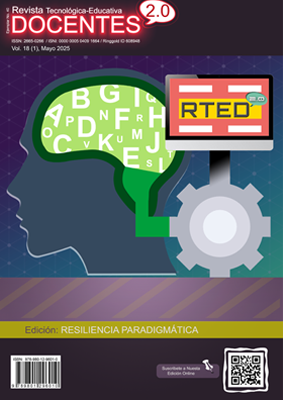Diseño de una Rúbrica para Evaluar Instrumentos no Escritos con TIC en el Enfoque por Competencias
 DOI:
https://doi.org/10.37843/rted.v18i1.596
DOI:
https://doi.org/10.37843/rted.v18i1.596
Contenido principal del artículo
Resumen
Crear una investigación es un reto a través del tiempo, ya que circulan simultáneamente corrientes filosóficas del pensamiento, que cambian constantemente, dado el devenir de una tecnología que invade el desarrollo humano y amenaza con sustituir al individuo por una computadora, que facilite el trabajo. La investigación tuvo como propósito el diseño de la rúbrica de evaluación para instrumentos no escritos apoyados en las tecnologías de información y comunicación (TIC), en una carrera basada en enfoque por competencia, específicamente para el curso de Técnicas de Muestreo y Estadística Básica, con el fin de determinar los recursos y medios necesarios para evaluar los conocimientos y competencias con los medios apropiados. Desde el punto de vista metodológico, se enmarco dentro en el paradigma positivista, con un enfoque cuantitativo de diseño no experimental de tipo descriptivo. La población consultada fue de quince profesores de la carrera, quienes contestaron una encuesta como mecanismo de apoyo para alcanzar los objetivos, enmarcándose el desarrollo del trabajo en un esquema de fases. Utilizando la revisión documental, los resultados del cuestionario y evaluación del programa, se determinaron los componentes que debería de contener la rúbrica, finalizando con el desarrollo de la misma, indicando como debería ser instrumentalizada.
Descargas
Métricas
Detalles del artículo

Esta obra está bajo una licencia internacional Creative Commons Atribución-NoComercial-SinDerivadas 4.0.
Aquellos autores que tengan publicaciones en nuestra revista aceptan los términos siguientes:
- En el momento en que una obra es aceptada para su publicación, el autor conserva los derechos de reproducción, distribución de su artículo para su explotación en todos los países del mundo en el formato proporcionado por nuestra revista, así como en cualquier otro soporte magnético, óptico y digital.
- Los autores conservarán sus derechos de autor y garantizarán a la revista el derecho de primera publicación de su obra, el cual estará simultáneamente sujeto a la Licencia de reconocimiento de Creative Commons (Attribution-NonCommercial-NoDerivatives 4.0 International (CC BY-NC-ND 4.0)) que permite a terceros copiar y redistribuir el material en cualquier medio o formato, Bajo las condiciones siguientes: Reconocimiento — Debe reconocer adecuadamente la autoría, proporcionar un enlace a la licencia e indicar si se han realizado cambios. Puede hacerlo de cualquier manera razonable, pero no de una manera que sugiera que tiene el apoyo del licenciador o lo recibe por el uso que hace. NoComercial — No puede utilizar el material para una finalidad comercial. SinObraDerivada — Si remezcla, transforma o crea a partir del material, no puede difundir el material modificado. No hay restricciones adicionales — No puede aplicar términos legales o medidas tecnológicas que legalmente restrinjan realizar aquello que la licencia permite.
- Los autores podrán adoptar otros acuerdos de licencia no exclusiva de distribución de la versión de la obra publicada (p. ej.: depositarla en un archivo telemático institucional o publicarla en un volumen monográfico) siempre que se indique la publicación inicial en esta revista.
- Se permite y recomienda a los autores difundir su obra a través de Internet (p. ej.: en archivos telemáticos institucionales, repositorios, bibliotecas, o en su página web), lo cual puede producir intercambios interesantes y aumentar las citas de la obra publicada.
- El retiro de un artículo se solicitará por escrito al Editor, haciéndose efectivo luego de respuesta escrita de este. Para tal efecto, el o los autores enviarán correspondencia vía E-mail: [email protected].
- El autor no recibirá compensación económica por la publicación de su trabajo.
- Todas las publicaciones de la Revista Docentes 2.0, están bajo la plataforma Open Journal System (OJS) en dirección: https://ojs.docentes20.com/
Citas
Acosta, P. & Díaz, I. (2005). Programa del Curso de Técnicas de Muestreo y Estadística Básica. Creación de la Carrera de Ingeniería de Procesos Industriales. Escuela de Ingeniería de Procesos Industriales. Facultad de Ingeniería. Universidad Central de Venezuela.
Arias, F. (2012). El proyecto de la Investigación. Introducción a la Investigación Científica (Sexta Edición). Editorial Episteme.
Babativa, C. (2017). Investigación Cuantitativa. Revista Areandina, (1). 46 – 62. https://n9.cl/pwblq DOI: https://doi.org/10.33132/9789585459007
Barrios, R., O., (2018). Uso de Rúbrica. Una Guía para el Profesor. Universidad Tecnológica Metropolitana. https://n9.cl/rvg9k
Bernal, T., & Augusto, C. (2010). Metodología de la Investigación (Tercera Edición). Editorial Prentice Hall.
Cano, M. C., & Ordoñez, E. J. (2021). Formación del profesorado en Latinoamérica. Revista de Ciencias Sociales (Ve), XXVII (2), 284-295. https://doi.org/10.31876/rcs.v27i2.35915 DOI: https://doi.org/10.31876/rcs.v27i2.35915
Gamarra-Mendoza, F. (2019). La aplicabilidad de la evaluación por competencias en los escenarios universitarios. Prohominum. Revista de Ciencias Sociales y Humanas, 2(1). https://n9.cl/9q8okh DOI: https://doi.org/10.47606/prohominum.v2i1.66
Guillén, A (2021). Modelo del plan evaluativo para un curso diseñado bajo el esquema educación basada en competencias. Repositorio Saber UCV. https://n9.cl/ev3ce
Herrera, J. (2018). Las prácticas investigativas contemporáneas. Los retos de sus nuevos planteamientos epistemológicos. Revista Scientific. Instituto Internacional de Investigación y Desarrollo Tecnologico Educativo (INDITEC). 3(7). 6 – 15. https://n9.cl/iso5p5 DOI: https://doi.org/10.29394/Scientific.issn.2542-2987.2018.3.7.0.6-15
Hincapíe, N., & Clemenza, C. (2022), Evaluación de los aprendizajes por competencias: Una mirada teórica desde el contexto colombiano. Revista de Ciencias Sociales. Universidad del Zulia. 106 – 120. https://n9.cl/dfkjbr
McClelland, D. (1973). Testing for competence rather than intelligence. American Psychologist, 28.1-14. https://n9.cl/kqp89 DOI: https://doi.org/10.1037/h0034092
Ramos, C., Beresaluce, R., & Peiró, S. (2016). La evaluación por competencias en la Universidad. Octaedro. https://n9.cl/ozro
Rodríguez, Á. F., Mendoza, M. M., & Cargua, N. I. (2019). El proyecto integrador de saberes, una oportunidad para aprender a aprender. Revista Digital de Educación Física, 10(57), 62-77. https://n9.cl/ha3npk
Sierra, B., R. (2007). Tesis Doctorales y Trabajos de Investigación Científica. Metodología General en su Elaboración y Documentación (Quinta Edición). Editores Thomson.
Torres, J., & Perera, V. (2010). La rúbrica como instrumentos pedagógicos para la tutorización y evaluación de los aprendizajes en el foro online en educación superior. Revista de Medios y Comunicación. Pixel-Bit. Revista de Medios y Educación. Universidad de Sevilla. https://n9.cl/pt3ma
Ventura-León, J. (2017). ¿Población o muestra?: Una diferencia necesaria. Revista Cubana de salud Pública. 43(4). https://n9.cl/ox05v






